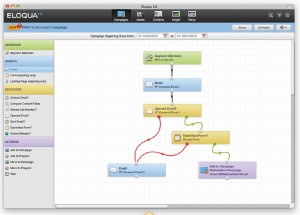Customers, Competitors & Consultants Weigh In On Impact Of Eloqua10 Release
- Published in Feature Articles
 The long-awaited launch of Eloqua10 last week has caused quite a stir in the marketing automation space as customers, consultants and even competitors have weighed in on the potential impact of release. The product’s advanced ease-of-use and added functionality around Revenue Performance Management (RPM) could be potential game changers for the marketing automation space.
The long-awaited launch of Eloqua10 last week has caused quite a stir in the marketing automation space as customers, consultants and even competitors have weighed in on the potential impact of release. The product’s advanced ease-of-use and added functionality around Revenue Performance Management (RPM) could be potential game changers for the marketing automation space.
"Eloqua10 is a stunning piece of web software,” said Sam Boonin, VP Marketing at GoodData, a cloud business intelligence provider. “It seems that every marketing automation vendor likes to talk about analytics these days — it's nice to see Eloqua start to deliver on the promise."
Several Eloqua customers have chimed in about version 10’s ease-of-use and easy-to-access information. Robin Cangie with WebTrends said: "I was impressed by the added depth of reporting and how easy it seems to be able to create web forms. I can't wait to get my hands on that."
Dave Walsh with IT XChange said, “Eloqua10 stood out for its drag/drop interface and what looked like a very intuitive way to build programs.”
"Web 2.0 encourages SaaS applications to reinvent their interfaces and Eloqua10 sets a new standard for cloud based applications," said David Lewis, CEO of DemandGen. "They've made creating emails so easy that the only hard part is deciding your subject line."
Former Eloqua partner Jeff Pedowitz, President of leading demand generation consultancy The Pedowitz Group, also credited the progress the company made with the new release. “Eloqua10 is a welcome change in that Eloqua has taken the time and effort to produce a product that is easy to use and still maintains its powerful functionality. While I don't think it is a game changer, it will certainly make the competitive landscape more even and change the dialogue towards a solution focus.”
Eloqua’s top competitor, Marketo, also offered their take on the new release. While Marketo’s CEO Phil Fernandez suggested Eloqua was playing catch up to his company’s product in terms of ease of use and functionality, he was in agreement with Eloqua’s concentration on Revenue Performance Management. “We agree that, for whatever competition is out there, it’s a good thing to be talking about revenue,” said Marketo CEO Phil Fernandez. “That’s how the market gets bigger. Together we’re going to fill a much bigger market. The exciting thing is that this could be a great competition, but if we start to really create a category that focuses on revenue, good things can happen for us, potentially.”
Eloqua’s Founder and CTO Steve Woods pointed out that the Eloqua Insights feature, which is designed to provide a greater depth of analytics and data visualization, will be key to managing revenue. “With Eloqua10, we are making three major leaps forward on the path to revenue performance management,” said Woods. “Building on what was already a huge strength, this analytical depth puts Eloqua in a unique position within the industry… We opened up the platform in a broader way than ever before, allowing deep technology synergies with every other technology within a company’s revenue engine.”
The Eloqua Discover solution is designed to provide salespeople with rich insight from the sales committee, giving greater visibility for complex sales. The tool offers rich data on prospect buying signals, including which are most active and recent.
Emphasizing the importance of innovation, Eloqua CEO Joe Payne introduced the “C-Suite 16,” during Eloqua Experience last week, which he described as a standard set of sales and marketing reports focused on providing sales organizations with “One View Of The Truth” of revenue performance. Echoing the ever-present encouragement to get sales and marketing on the same page, Payne emphasized how important it is for the two teams to work from one set of consistent, agreed-upon metrics and information.
Payne said the company anticipates these reports will be adopted across industries and labeled GAAP for Sales and Marketing.
Payne offered two principles that separate RPM from previous marketing practices:
1. Focus on the entire funnel- Every organization should measure forecast and the bottom part of the sales funnel. This enables organizations to move opportunities forward to a qualified lead. Payne pointed out that if you study the higher part of the funnel, you can develop a better understanding for forecasting throughout upcoming quarters.
2. Be consistent and use a framework- Emphasizing the importance of value, performance and effectiveness, Payne said RPM has to include standards to define how much investment is put out and what return was yielded from it. Eloqua coined the term “Days Leads Outstanding” (DLOs) to examine trends over time and find that sales cycles are lengthening. Most companies measure opportunities to close deals.

